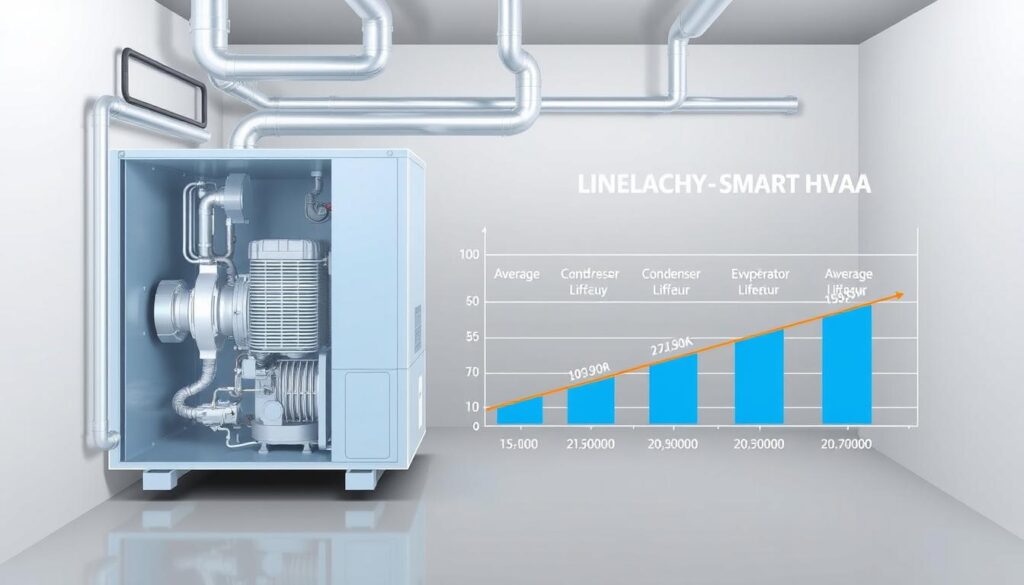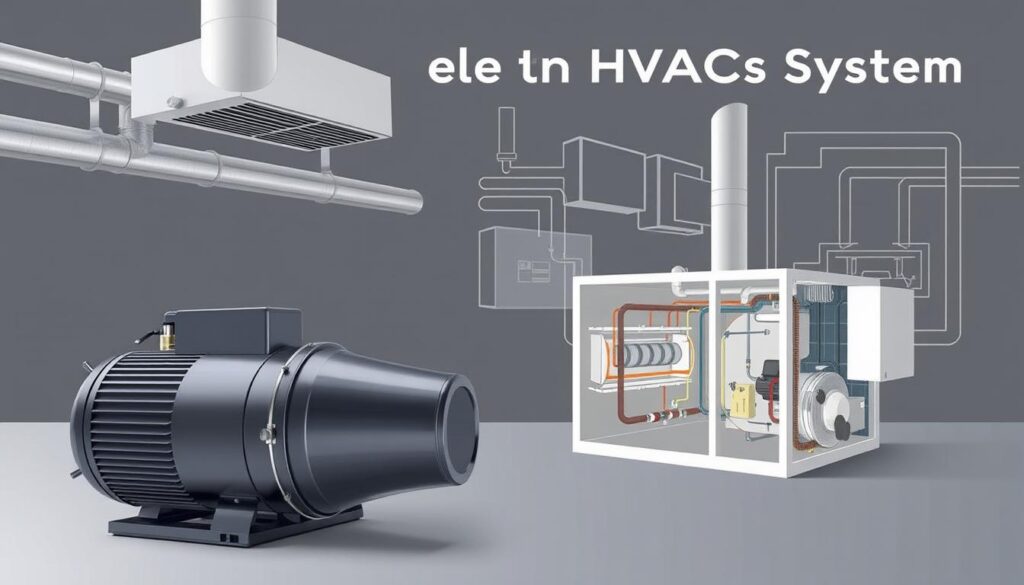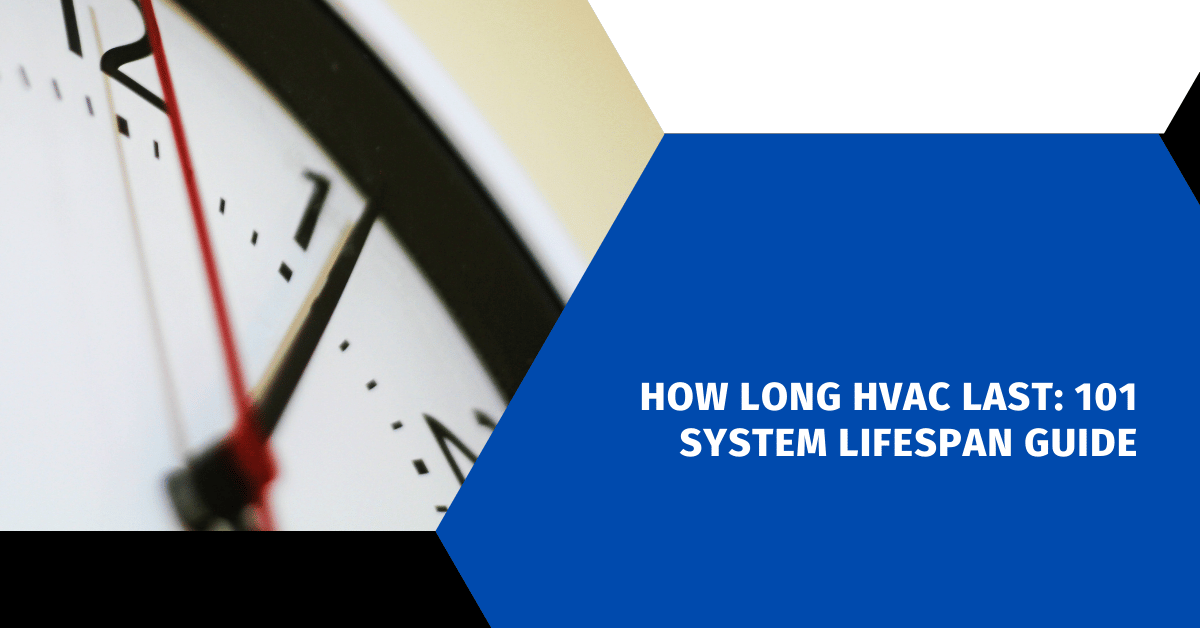How Long HVAC Last? Ever thought about how long your home’s heating and cooling system will last? Knowing how long an HVAC system lasts is key for homeowners. It helps them make smart choices for their home’s comfort and efficiency.

A typical home HVAC system can last 10 to 25 years. But, its lifespan depends on many things. It’s not just about how old it is. Maintenance, how much you use it, and the environment also play big roles.
Knowing when to fix or replace your HVAC can save you a lot of money. It also helps avoid sudden breakdowns when the weather is extreme. This guide will cover everything you need to know about HVAC lifespan and keeping it running well.
Key Takeaways
- Typical HVAC systems last 10-25 years with proper care
- Regular maintenance significantly extends system life
- Different HVAC types have varying average lifespans
- Environmental factors impact system durability
- Early detection of performance issues can prevent costly replacements
Table of Contents
Understanding HVAC System Basics
Your home’s comfort relies on a complex network of heating, ventilation, and air conditioning (HVAC) systems. These systems are key to keeping your home at the right temperature and air quality. With US homes using over 50% of their energy for heating and cooling, knowing about HVAC durability is vital.
HVAC systems vary, each designed for different home comfort needs. The most common types are:
- Split systems with indoor and outdoor units
- Hybrid dual-fuel systems
- Ductless mini-split systems
- Packaged heating and cooling units
Essential HVAC Components
Modern HVAC systems have advanced parts that help them last longer. Important components include:
- Compressor
- Condenser coils
- Evaporator coils
- Air handler
- Thermostat
Home Comfort Essentials
Your HVAC system does more than just control temperature. It also manages air quality and humidity, making your home comfortable. Proper maintenance can extend your system’s life, potentially up to 15 years or more.
Knowing these basics helps you make better choices about your system. This includes picking the right one, keeping it maintained, and upgrading when needed. It protects your home’s comfort and your investment.
Explore Our HVAC Shop
Looking for top-rated HVAC tools, parts, and accessories? Visit our shop and find the perfect solution for your needs.
Visit the ShopAverage Lifespan of Different HVAC Systems
Knowing when to replace your HVAC is key to keeping your home comfy. Each system’s lifespan depends on how often you use it and how well you maintain it.
Here’s how long different HVAC systems usually last:
- Central Air Conditioning Systems: 12-17 years
- Furnaces: 15-30 years
- Heat Pumps: 10-15 years
- Boilers: 15-20 years
As your HVAC gets older, it uses more energy and works less well. About 70% of people replace theirs after 10-15 years. Newer systems can be up to 40% more efficient.
Regular maintenance can make your system last longer. Getting annual professional inspections can add 5-10 years. Keeping your system in good shape prevents sudden failures and keeps it running smoothly.
Investing in routine care is far more cost-effective than emergency replacements.
Things like how well it was installed, the environment, how often you use it, and upkeep affect how long it lasts. Knowing these can help you decide when to replace or maintain your system.
How Long HVAC Last in Various Climate Conditions
The lifespan of your HVAC system greatly depends on your climate. Different weather conditions can affect how long your system lasts and how well it works.
Living in coastal areas brings special challenges for your HVAC. The salty air can cause corrosion, shortening your system’s life to 7-12 years. People in these areas need to choose equipment that resists corrosion and do more maintenance.
- Hot climates stress air conditioning units more intensely
- Cold regions place additional strain on heating systems
- Humid environments increase the risk of moisture damage
In areas with extreme temperatures, your HVAC system has to work harder. Heat pumps in southern states might wear out faster than furnaces in northern regions.
When choosing and caring for your HVAC, consider your local climate. Getting it installed right and having regular checks can help it last longer.
Proactive maintenance is your best defense against premature HVAC system failure.
Knowing the specific challenges of your local climate helps you make better choices about your HVAC. This includes picking the right system, keeping it in good shape, and knowing when to replace it.
Explore Our HVAC Shop
Looking for top-rated HVAC tools, parts, and accessories? Visit our shop and find the perfect solution for your needs.
Visit the ShopFactors Affecting HVAC System Longevity
Knowing what affects your HVAC system’s life is key for homeowners. The system’s durability depends on many factors. These factors greatly impact its efficiency and how long it lasts.

Several important things decide how long your HVAC system will work well:
- Installation Quality
- Usage Patterns
- Environmental Conditions
Professional Installation Matters
Getting your HVAC installed right is the first step to a long life. A system that’s not the right size or installed wrong can lose up to 30% efficiency. Experts make sure it’s sized right, ductwork is correct, and the system is set up for best performance.
Smart Usage Patterns
How you use your HVAC system affects its life. Keeping the temperature steady, not changing it too much, and using it wisely helps keep it running longer.
Environmental Impact
The weather where you live has a big impact on your HVAC system. Places with very hot or cold weather or high humidity make your system work harder. Dust, dirt, and poor air quality can also wear it down faster.
Proactive maintenance is the key to extending your HVAC system’s operational lifespan.
The average HVAC system lasts 10 to 25 years, depending on these critical factors. Getting regular check-ups and tune-ups from pros can help your system last longer and work better.
Essential Maintenance for Maximum Lifespan
Keeping your HVAC system running well needs regular and smart maintenance. By doing so, you can make your system work better and avoid expensive repairs. The right care can even add years to your system’s life.
Key maintenance steps to extend your HVAC’s life include:
- Monthly air filter replacement
- Quarterly exterior unit cleaning
- Annual professional system inspection
- Checking refrigerant levels
- Cleaning condensate drain lines
Experts say proactive maintenance is key. Dirty air filters can cut system efficiency by up to 20%. So, changing them often is vital for top performance.
Doing maintenance yourself can also help a lot. You can:
- Clean around outdoor units
- Replace filters regularly
- Check thermostat function
- Listen for odd system sounds
Most HVAC pros suggest getting professional help twice a year. This is usually before summer and winter. It helps find problems early, keeping your system efficient and prolonging its life.
Regular maintenance can extend your HVAC system’s lifespan by 5 to 15 years, representing significant long-term savings.
Explore Our HVAC Shop
Looking for top-rated HVAC tools, parts, and accessories? Visit our shop and find the perfect solution for your needs.
Visit the ShopSigns Your HVAC System Needs Replacement
Spotting the signs of an aging HVAC system can prevent sudden breakdowns and expensive repairs. A good heating and cooling system keeps your home comfortable and energy-efficient.

Knowing when to replace your HVAC system involves looking out for certain warning signs. Homeowners should watch for key indicators.
Performance Issues to Watch
- Uneven heating or cooling throughout your home
- Unusual noises like grinding, squealing, or banging
- Weak airflow from vents
- Inconsistent temperatures between rooms
Rising Energy Bills Signal Trouble
A sudden increase in energy bills might mean your HVAC system is not working right. Aging systems use more electricity but offer less comfort. Systems over 10 years old often lose a lot of efficiency.
| System Age | Efficiency Loss | Potential Cost Increase |
|---|---|---|
| 10-15 years | 15-25% | $200-$400 annually |
| 15-20 years | 25-40% | $400-$700 annually |
Frequency of Repairs
If you’re getting repairs often, it might be smarter to get a new system. About 30% of repair costs could be more than a new unit’s price.
- More than two major repairs per year
- Repair costs exceeding 50% of a new system’s price
- Recurring refrigerant leaks
- Electrical component failures
If you see many signs of an aging HVAC system at once, it’s time to talk to a pro. They can help you decide if it’s time for a new one.
Cost Considerations Over HVAC Lifetime
Understanding the financial side of HVAC systems is key for homeowners. Your HVAC investment is more than the initial cost. The efficiency of your HVAC over time greatly affects your long-term expenses and savings.
When thinking about replacing your HVAC, consider these financial points:
- Initial installation costs
- Ongoing maintenance expenses
- Potential repair frequency
- Energy efficiency degradation
Modern HVAC systems offer big economic benefits. New systems can cut your energy use, saving you money on bills.
| HVAC System Type | Average Lifespan | Estimated Energy Savings |
|---|---|---|
| Central Air Conditioning | 15-20 years | Up to 20% annually |
| Heat Pump | 10-15 years | Up to 30% annually |
| Geothermal System | 25-30 years | Up to 40% annually |
Think about the total cost of ownership, not just the price. A more expensive, efficient system can save you thousands over time.
Planning for HVAC replacement means weighing current performance against future savings. Talking to HVAC experts can guide you to a choice that fits your budget and comfort needs.
Explore Our HVAC Shop
Looking for top-rated HVAC tools, parts, and accessories? Visit our shop and find the perfect solution for your needs.
Visit the ShopEnergy Efficiency and System Lifespan
Knowing how HVAC efficiency changes over time is key for homeowners. Modern HVAC tech has changed how we enjoy home comfort and save energy.
Modern Efficiency Standards
Today’s HVAC systems use much less energy than old ones. Heat pumps can now cut up to 50% of heat-based energy use compared to older models. This big change means:
- Less energy use
- Lower utility bills
- Less carbon footprint
Impact on Operating Costs
Your hvac replacement timeline affects your energy costs over time. New systems save a lot:
- Energy-efficient units can cut annual energy costs by up to 30%
- Advanced tech means less maintenance costs
- They work better with less strain
“Investing in an efficient HVAC system is not an expense, but a long-term financial strategy.” – Energy Efficiency Expert
Environmental Considerations
Modern HVAC systems do more than save money. They also help the environment by using less energy and sustainable tech.
Professional Maintenance vs. DIY Care
Keeping your HVAC system in good shape is key to making it last longer and work better. While some people like to do things themselves, getting a pro to do the maintenance has many advantages.
Doing maintenance yourself can save you money and keep your system running well. Here are some things you can do safely:
- Replace air filters every 1-3 months
- Clean exterior unit from debris
- Check thermostat batteries
- Ensure clear airflow around vents
Professional HVAC maintenance does a lot more. Experts offer services that really protect your investment:
- Comprehensive system diagnostics
- Refrigerant level checks
- Electrical connection inspections
- Detailed performance evaluations
Professional maintenance can cut down on unexpected breakdowns by up to 75%. It can also make your system last 5-10 years longer. Most makers say you should get a pro to check it every year to keep the warranty good.
Investing in professional maintenance is a lot cheaper than having to replace your whole HVAC system too soon.
But, remember, if you need to fix electrical parts or add refrigerant, you should only let a licensed pro do it. Your safety and the health of your system depend on it.
Explore Our HVAC Shop
Looking for top-rated HVAC tools, parts, and accessories? Visit our shop and find the perfect solution for your needs.
Visit the ShopUpgrading vs. Replacing Your HVAC System
Choosing between upgrading or replacing your HVAC system is tough. Your home’s comfort, energy use, and long-term costs are key. You need to think about your current system’s performance and future benefits.
Homeowners should look at several important things when thinking about HVAC efficiency over time:
- Current system age and performance
- How often you’ve had to repair it
- How much energy it uses
- Any cost savings you might see
Technology Advancements
New HVAC technologies are much better at saving energy. Modern systems have SEER ratings up to 20, compared to older systems’ 10. This means they use 20-40% less energy, saving you a lot of money each year.
| System Type | Energy Efficiency | Estimated Annual Savings |
|---|---|---|
| Old HVAC System (15+ years) | SEER 10 | $0 |
| Modern HVAC System | SEER 14-20 | $100-$300 |
Economic Factors
Upgrading part of your system can save money, but a full replacement offers more benefits. There are financing options and tax credits that can help make it more affordable. Getting a new system can also increase your home’s value and attract buyers.
Environmental Impact
Choosing an eco-friendly HVAC system is good for the planet. Modern systems use less energy and have better refrigerants. By picking an energy-efficient system, you help reduce energy use and support green efforts.
Conclusion
Knowing how long HVAC systems last is key for homeowners who want comfort and efficiency. Your HVAC system is a big investment, lasting 15 to 25 years with good care. Understanding what affects its lifespan helps you make smart choices about upkeep and when to replace it.
Regular maintenance is vital for a long-lasting HVAC system. Getting professional checks, changing filters on time, and taking care of your system early on keeps it running well. Choosing high-quality brands and proper installation can also save you money in the long run.
Newer HVAC models are more energy-efficient and better for the environment. If your system is old and needs more repairs, or if your energy bills are high, it might be time for a new one. Investing in modern HVAC technology can make your home more comfortable and save you money over time.
Your approach to HVAC care greatly affects its performance and lifespan. Be proactive, schedule maintenance, and watch how your system works. With the right care and knowledge, your HVAC system will last longer, keeping your home comfortable for years.

